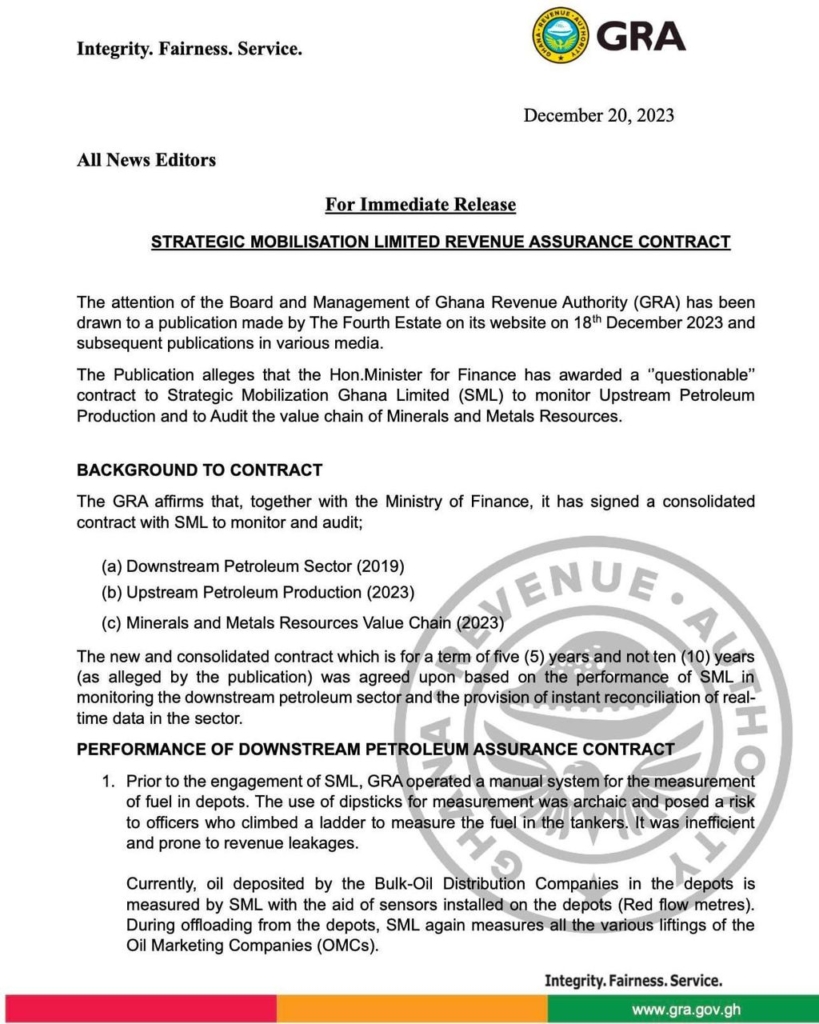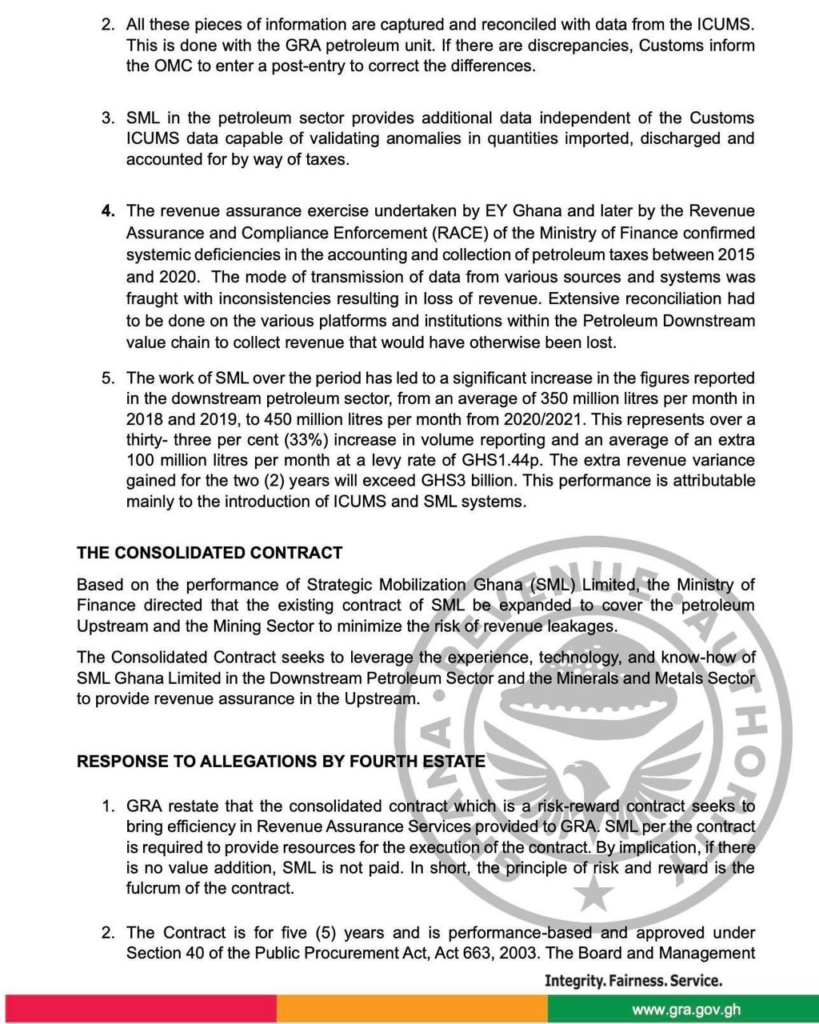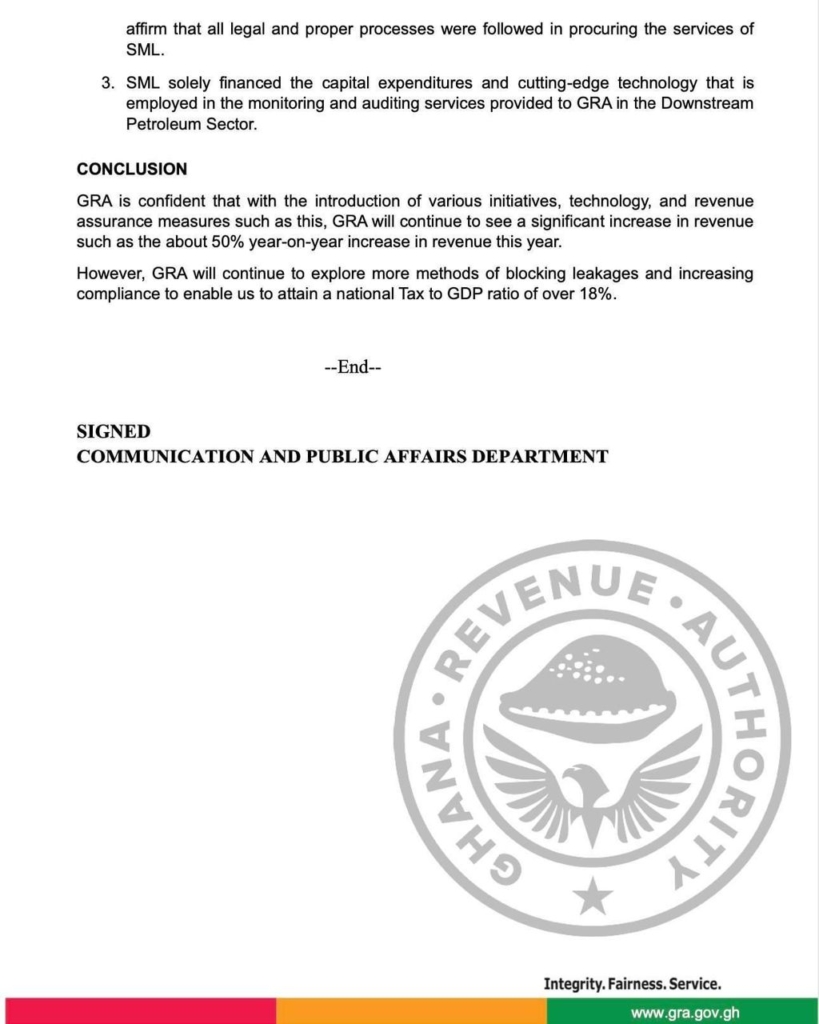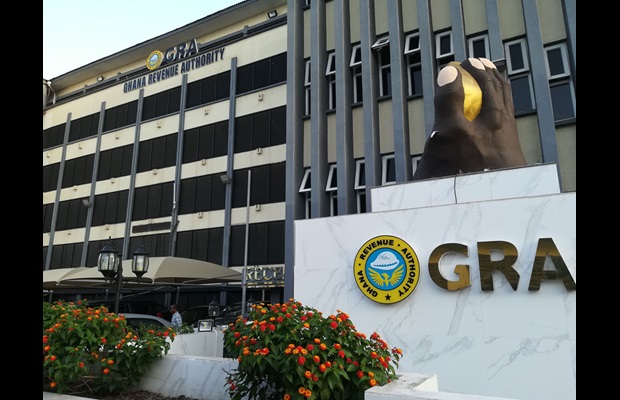GRA denies ‘questionable’ contract with SML; insists deal saved Ghana ¢3bn
The Ghana Revenue Authority (GRA) has denied publication by ‘The Fourth Estate’ that it awarded a ‘questionable’ contract to Strategic Mobilization Ghana Limited (SML) to monitor Upstream Petroleum Production and to audit the value chain of Minerals and Metals Resources.
In a statement, the authority affirmed that, together with the Ministry of Finance, it signed a consolidated contract with SML to monitor and audit Downstream Petroleum Sector in 2019, Upstream Petroleum Production in 2023, and the Minerals and Metals Resources Value Chain in 2023.
It explained that the contract is designed to operate for five years contrary to the ten years published by media organization, The Fourth Estate.
“The new and consolidated contract which is for a term of five years and not ten years as alleged by the publication and was agreed upon based on the performance of SML in monitoring the downstream petroleum sector and the provision of instant reconciliation of real-time data in the sector”, the statement signed by the Communication And Public Affairs Department of the GRA said.
Cataloguing the Performance of the Downstream Petroleum sector under the Assurance Contract, the GRA, said before the engagement of SML, the authority operated a manual system for the measurement of fuel in depots.
According to the GRA, the use of dipsticks for measurement was archaic and posed a risk to officers who climbed a ladder to measure the fuel in the tankers.

“It was inefficient and prone to revenue leakages. Currently, oil deposited by the Bulk-Oil Distribution Companies in the depots is measured by SML with the aid of sensors installed on the depots (Red flow metres). During offloading from the depots, SML again measures all the various liftings of the Oil Marketing Companies (OMCs)”.


It insisted that all the pieces of information are captured and reconciled with data from the ICUMS which is done with the GRA petroleum unit.
The statement said if there are discrepancies, Customs inform the OMC to enter a post-entry to correct the differences.
It pointed out that SML in the petroleum sector provides additional data, independent of the Customs ICUMS data capable of validating anomalies in quantities imported, discharged and accounted for by way of taxes.
The GRA continued that the revenue assurance exercise undertaken by EY Ghana and later by the Revenue Assurance and Compliance Enforcement (RACE) of the Ministry of Finance confirmed systemic deficiencies in the accounting and collection of petroleum taxes between 2015 and 2020.
“The mode of transmission of data from various sources and systems was fraught with inconsistencies resulting in loss of revenue”, the statement said, adding that “extensive reconciliation had to be done on the various platforms and institutions within the Petroleum Downstream value chain to collect revenue that would have otherwise been lost”
It emphasised that the work of SML over the period has led to a significant increase in the figures reported in the downstream petroleum sector, from an average of 350 million litres per month in 2018 and 2019, to 450 million litres per month from 2020/2021.
This, it said, represents over a 33% increase in volume reporting and an average of an extra 100 million litres per month at a levy rate of ¢1.44.
Defending earlier figures from SML, the GRA maintained that the extra revenue variance gained for the two years will exceed ¢3 billion, which performance is attributable mainly to the introduction of ICUMS and SML systems.
“Based on the performance of Strategic Mobilization Ghana (SML) Limited, the Ministry of Finance directed that the existing contract of SML be expanded to cover the petroleum upstream and the Mining Sector to minimize the risk of revenue leakages. The Consolidated Contract seeks to leverage the experience, technology, and know-how of SML Ghana Limited in the Downstream Petroleum Sector and the Minerals and Metals Sector to provide revenue assurance in the Upstream”.
The GRA stressed that the consolidated contract which is a risk-reward contract seeks to bring efficiency in Revenue Assurance Services provided to GRA.
By this, it said, SML per the contract is required to provide resources for the execution of the contract. By implication, if there is no value addition, SML is not paid.
“In short, the principle of risk and reward is the fulcrum of the contract. The Contract is for five (5) years and is performance-based and approved under Section 40 of the Public Procurement Act, Act 663, 2003. The Board and Management affirm that all legal and proper processes were followed in procuring the services of SML”.
It disclosed that SML solely financed the capital expenditures and cutting-edge technology that is employed in the monitoring and auditing services provided to GRA in the Downstream Petroleum Sector.
“GRA is confident that with the introduction of various initiatives, technology, and revenue assurance measures such as this, GRA will continue to see a significant increase in revenue such as the about 50% year-on-year increase in revenue this year. However, GRA will continue to explore more methods of blocking leakages and increasing compliance to enable us to attain a national Tax to GDP ratio of over 18%”, the statement ended.



